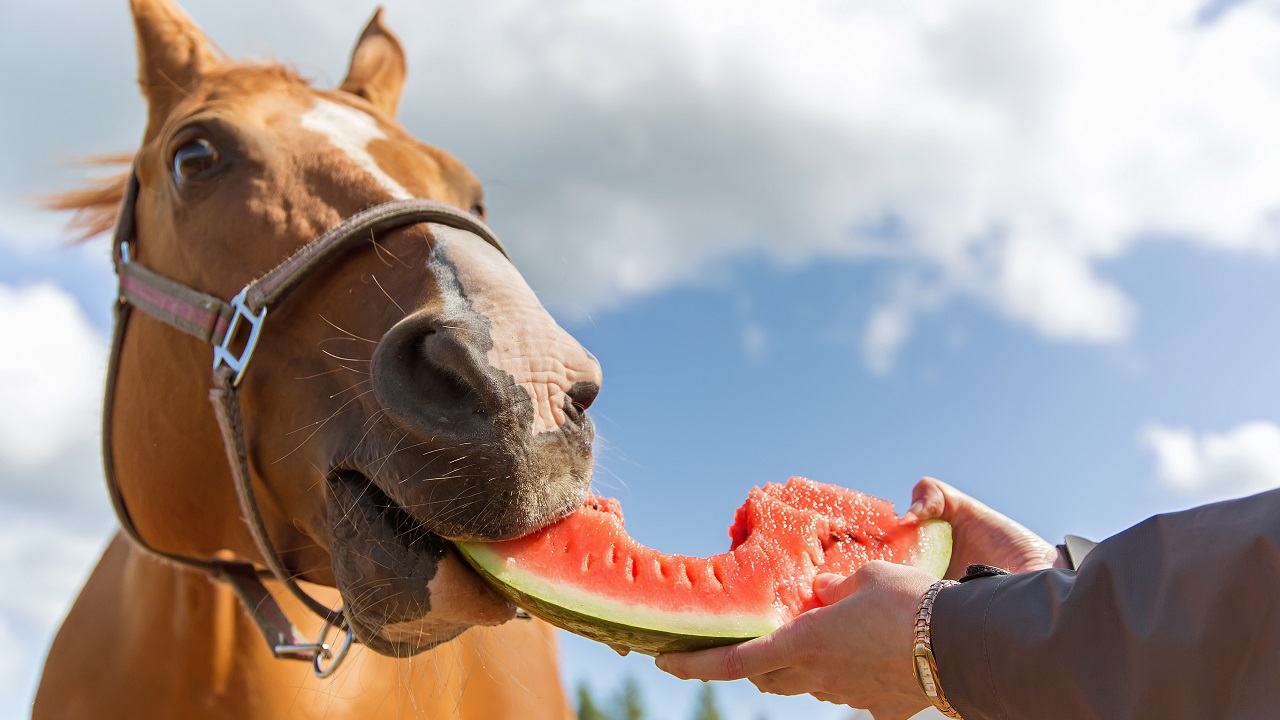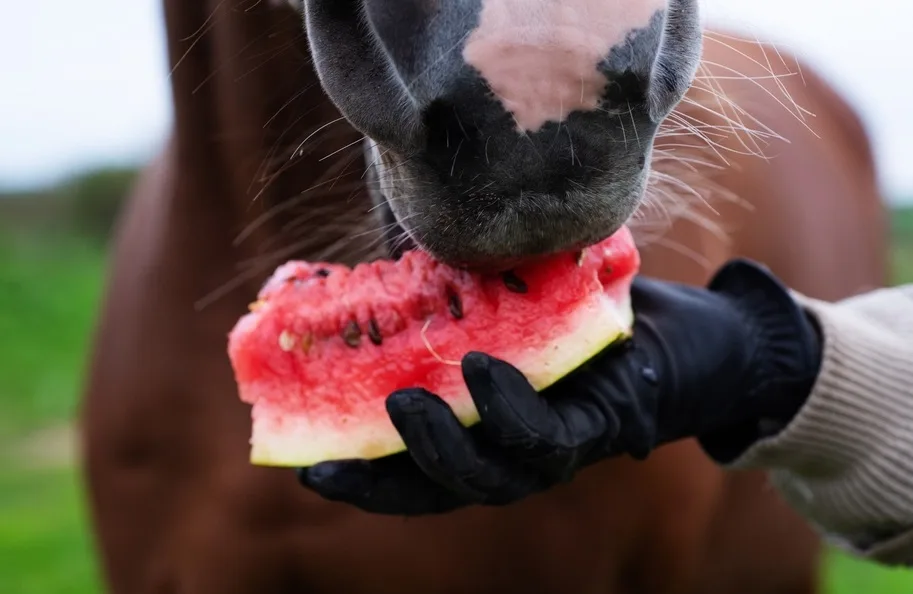Can Horses Eat Watermelon? Safety, Nutrition & How to Feed Them

This post may contain affiliate links. We earn from qualifying purchases. Learn More
Horses, majestic and versatile creatures, have diverse diets that intrigue many equestrians and horse-lovers alike. One frequently asked question that emerges among enthusiasts is, ‘Can horses eat watermelon?’
This juicy, summer staple, loved by humans for its refreshing taste, prompts curiosity regarding its suitability for equine consumption.
Understanding the dietary nuances and potential health impacts of watermelon for horses is essential for ensuring their well-being.
As we dive deeper into equine nutrition and dietary preferences, this guide will unveil the truths and myths surrounding horses and their potential love affair with watermelons.
Can Horses Eat Watermelon?
Yes, horses can eat watermelon. Just like people, horses will love a sweet and juicy slice of watermelon on a hot summer day. Watermelon can be given as a treat on a regular basis. However, you should never give another person’s horse treats without their permission.
Here are some handy facts you should know before feeding your horse watermelon as a treat.
Can Horses Eat Watermelon Rinds?
Watermelon rinds are safe for horses to enjoy in small quantities. In fact, many horses love the crunchy texture of watermelon rinds.
The flesh, seeds, and rind of a watermelon are all safe for a horse to eat. Watermelon rinds should be cut into small pieces as large pieces could potentially cause choke in a horse.
Before feeding your horse watermelon rind, be sure to wash it off well. The rind could have been sprayed with pesticides or herbicides, or it may carry bacteria such as E. coli, so washing is important.
How Much Watermelon Can a Horse Eat?
A horse can eat a few slices of watermelon and up to two cups of watermelon rinds a day. It is important to remember that watermelon is a treat and should be fed in moderation. Feeding too much watermelon could potentially cause health problems like colic.

When first introducing your horse to watermelon, feed them a small amount and gradually work up to a few slices. If your horse ever displays any adverse reactions to eating watermelon stop feeding it to your horse.
Benefits of Feeding Watermelon to Horses
Not only do many horses love the taste of watermelon but it comes with several health benefits. Watermelons are free of cholesterol and fat while also being low in calories.
Watermelon is packed full of vitamins and minerals. It contains Vitamin C which is an antioxidant and also helps support the immune system. It also contains Vitamin A which is beneficial for the immune system, bone health, and eyesight, as well as Vitamin B6 which converts carbohydrates and fats into usable energy.
Watermelon is also a good source of calcium and phosphorus, which can strengthen the bones, teeth, and hooves while also preventing muscle contractions. Iron is also found in watermelon which can help boost the immune system and digestive system. Watermelon also contains magnesium which can work as an anti-inflammatory.
The watermelon rind is a good source of potassium, fiber, and amino acids. Potassium can help prevent fatigue and weakened muscles. Fiber is essential for the digestive system and can provide energy while amino acids can assist with muscle growth and reduce fatigue.
An intriguing article in the Journal of Animal Science delves into the relationship between citrulline, arginine, and nitric oxide in equines. The rind of watermelon offers significant dietary benefits to horses.
Since watermelon is mainly water it can be a particularly great treat during summer. It can help ensure that your horse is intaking enough liquid when temperatures get hot.
Ways to Feed Horses Watermelon
Watermelon slices with or without the rind can make a wonderful treat for horses. While the rind may be too hard for horses with dental problems, the soft flesh makes a great treat for horses that have problems chewing, like older horses.
Since watermelon contains a large amount of water, it can be a very messy treat for horses. If your horse makes a mess while eating watermelon it is a good idea to clean up afterward as the sticky watermelon juice will attract flies.
Watermelon Cubes
You can chop watermelon flesh and rinds into cubes for a tasty treat for your horses. You can feed the cubes directly to your horse or even add them to their grain for a nice surprise.
Watermelon Popsicles
For a refreshing summer treat, you can make your horse watermelon popsicles. Cut the watermelon into slices and place in the freezer overnight. Be sure to remove the rind as it will be too hard to eat when frozen.
You can also add watermelon to fruit popsicles for horses. Simply chop up your horse’s favorite fruits and vegetables and add them to a plastic cup with water and a dash of apple juice.
Freeze the popsicles overnight and place them in your horse’s feed trough. You can also freeze a string in the popsicle so you can tie it to a fence. Not only will the popsicle help cool your horse down on hot summer days but it will also keep them entertained.
Bran Mash with Watermelon
Watermelon can make a fun addition to bran mash for your horse. Smash the watermelon up with the bran mash and feed it to your horse for an extra special treat.
When to Avoid Giving a Horse Watermelon
While watermelon can make a great treat for many horses, not every horse should be given watermelon as a treat. Horses with certain health issues should not be fed watermelon.
Horses that have Hyperkalemic periodic paralysis (HYPP) should not be given watermelon. Watermelon contains potassium and horses with HYPP must cut their potassium intake.
Watermelon naturally contains sugar, around 10 grams per cup. Due to this, insulin-resistant horses should not eat watermelon. This includes horses that have Equine Cushing’s disease, equine metabolic system, and pituitary pars intermedia dysfunction.
Remember, feeding watermelon in moderation is key to a balanced diet. It can make a great treat for horses but you should only feed a few slices a day. When in doubt, it is always best to talk with your veterinarian before feeding your horse watermelon

